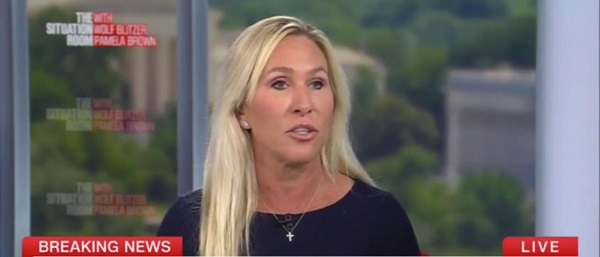International
Michelle Obama a favored option among voters to replace Biden on ticket

From The Center Square
By
President Joe Biden endorsed Vice President Kamala Harris Sunday when he announced he was ending his reelection bid.
But many voters say former First Lady Michelle Obama would be their preferred candidate, according to The Center Square Voters’ Voice polling. And they’ve said so since November.
They’re not alone. In late June, on the evening of the infamous debate performance by Biden, U.S. Sen. Ted Cruz on his podcast forecast she would replace the president as the party’s nominee.
Biden made his announcement to social media sites X and Facebook early Sunday afternoon. He’s been under close scrutiny since a June 27 debate against former President Donald Trump.
Michelle Obama has never said she is interested in running for the seat. But in November and January polls, when asked if they could wave a magic wand and pick their own candidate, a plurality of voters chose the former first lady over any other candidate. Harris finished a distance seventh.
In the poll, conducted with Noble Predictive Insights, 24% of Democrat-leaning likely voters would pick Michelle Obama. The former first lady was followed by Biden (20%), U.S. Sen. Bernie Sanders (12%), someone else (9%), U.S. Secretary of Transportation Pete Buttigieg (9%), former U.S. Secretary of State Hillary Clinton (8%), Vice President Kamala Harris (7%), and U.S. Sen. Elizabeth Warren (5%).

Three other Democrats finished further behind: Michigan Gov. Gretchen Whitmer got 4%, followed by Illinois Gov. J.B. Pritzker (1%) and U.S. Sen. Raphael Warnock (1%).
In a more recent The Center Square Voters’ Voice poll, conducted earlier this month, Democratic voters were presented with a similar question. When given the choice of Biden or a slew of other top Democrats, a plurality remained loyal to Biden – 34%. Harris and Obama, at 15% each, were next in line.

Daily Caller
Trump Gives Zelenskyy Until Thanksgiving To Agree On Peace Deal, With U.S. Weapons And Intel On The Line


From the Daily Caller News Foundation
President Donald Trump is turning up the heat on Ukrainian President Volodymyr Zelenskyy to accept a peace deal to end his war with Russia, and has set a deadline with potential consequences.
The U.S. is warning that certain weapons shipments and intelligence sharing could be at risk if Zelenskyy does not play ball with Trump’s peace proposal, Reuters reported on Friday. The president set a Thanksgiving deadline for Zelenskyy to sign off on the details. Speaking with Brian Kilmeade on Fox News Radio, Trump confirmed that date, saying that while deadlines can be extended, “Thursday is it.”
Speaking with Brian Kilmeade on Fox News Radio, Trump confirmed that, though deadlines can be extended, “Thursday is it.”
Zelenskyy signaled his willingness to discuss concessions outlined in the proposed peace deal despite objections from other European leaders over the terms, and said in a post on X that his whole government is at work on the individual points. However, the Ukrainian leader also said in a Friday video statement that the U.S. has put Ukraine in a position of “either losing its dignity or the risk of losing a key partner.”
Russian President Vladimir Putin, on the other hand, said Friday Trump’s plan could “form the basis” for a final peace agreement.
A U.S. official told the Daily Caller News Foundation they “will not comment on sensitive peace discussions that may or may not have happened.”
“President Trump is working with both sides to end the war as quickly as possible, which has gone on for far too long, with too many senseless deaths,” the official said. “This would have never happened if he was President.”
Zelenskyy most recently has been embroiled in a corruption scandal, as the National Anti-Corruption Bureau of Ukraine launched a probe into Zelenskyy’s business partner, who allegedly laundered $100 million from Ukraine’s nuclear energy company.
“It was strongly implied to the Ukrainians that the United States expects them to agree to a peace deal,” another U.S. official told the DCNF. “Any changes will be decided upon by the President himself.”
The Ukrainian leader has been working to shore up support in Europe as well, most recently signing a deal with France to obtain 100 Rafale jets for its air force. The deal also included anti-air equipment, drones and other munitions.
The Trump administration has worked to offload direct military support for Ukraine to partners in Europe, with NATO agreeing to purchase U.S. weapons to then ship to Ukraine, instead of the American government delivering directly.
Daily Caller
MTG Says She’s Resigning From Office


From the Daily Caller News Foundation
Republican Georgia Rep. Marjorie Taylor Greene announced Friday that she will step down from Congress.
Greene took to social media to announce her final day in office. Greene released the lengthy statement on X telling supporters, “I will be resigning from office with my last day being January 5, 2026.”
My message to Georgia’s 14th district and America.
Thank you. pic.twitter.com/tSoHCeAjn1— Marjorie Taylor Greene 🇺🇸 (@mtgreenee) November 22, 2025
Greene released a statement outlining her frustrations with both parties, portraying her decision as the culmination of years of disillusionment with Washington’s political culture. Greene said she has always tried to speak for “the common American man and woman,” arguing that her outsider posture made her an unwelcome presence in the capital.
“Americans are used by the Political Industrial Complex of both Political Parties, election cycle after election cycle, in order to elect whichever side can convince Americans to hate the other side more. And the results are always the same. No matter which way the political pendulum swings, Republican or Democrat, nothing ever gets better for the common American man or woman,” Greene wrote.
In her statement, Greene framed her five years in Congress as a fight to advance the “America First” agenda she embraced in 2020.
“I ran for Congress in 2020 and have fought every single day believing that Make America Great Again meant America First. I have one of the most conservative voting records in Congress defending the 1st amendment, 2nd amendment, unborn babies because I believe God creates life 1 at conception, strong safe borders, I’ve fought against Covid tyrannical insanity and mandated mass vaccinations, and I’ve never voted to fund foreign wars,” Greene added.
President Donald Trump cut support for Greene and called her a “traitor” after she criticized his foreign policy decisions and refused to withdraw her name from a petition demanding the release of the Jeffrey Epstein files. Greene fired back, calling herself a “patriot” for siding with Epstein’s victims and defending the America First agenda.
-

 Health2 days ago
Health2 days agoCDC’s Autism Reversal: Inside the Collapse of a 25‑Year Public Health Narrative
-

 Crime2 days ago
Crime2 days agoCocaine, Manhunts, and Murder: Canadian Cartel Kingpin Prosecuted In US
-

 Health2 days ago
Health2 days agoBREAKING: CDC quietly rewrites its vaccine–autism guidance
-

 National2 days ago
National2 days agoPsyop-Style Campaign That Delivered Mark Carney’s Win May Extend Into Floor-Crossing Gambits and Shape China–Canada–US–Mexico Relations
-

 Energy2 days ago
Energy2 days agoHere’s what they don’t tell you about BC’s tanker ban
-

 Daily Caller2 days ago
Daily Caller2 days agoBREAKING: Globalist Climate Conference Bursts Into Flames
-

 Bruce Dowbiggin2 days ago
Bruce Dowbiggin2 days agoBurying Poilievre Is Job One In Carney’s Ottawa
-

 Great Reset1 day ago
Great Reset1 day agoEXCLUSIVE: A Provincial RCMP Veterans’ Association IS TARGETING VETERANS with Euthanasia







